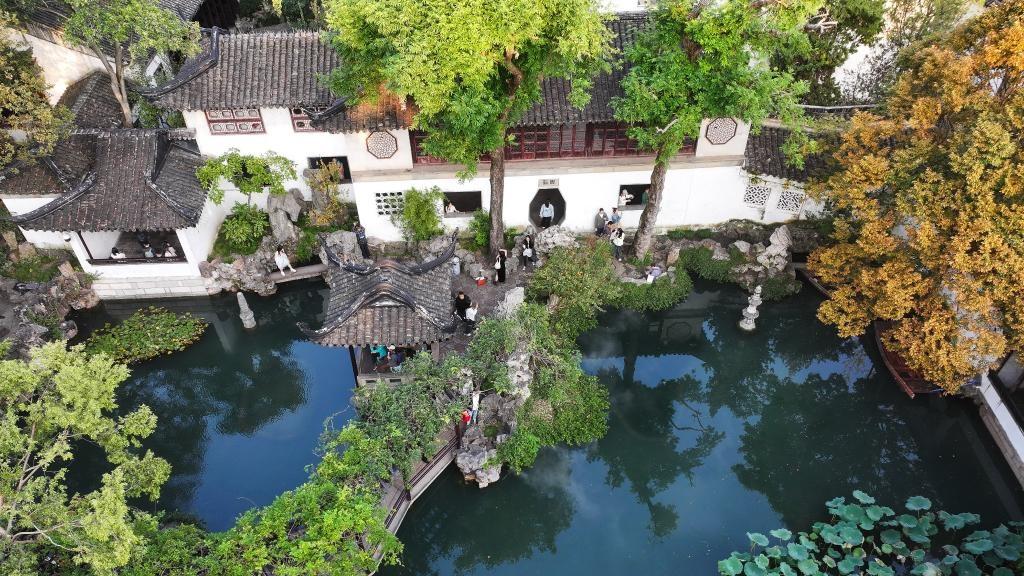News Analysis: EV dispute reflects new challenge for China-EU trade ties
BEIJING, Oct. 30 (Xinhua) -- Despite intensive talks between the two sides and China's great sincerity, the European Union (EU) has announced the imposition of anti-subsidy tariffs up to 35.3 percent on Chinese-made battery electric vehicles (EVs) from Wednesday.
It is a move that many view as a disappointing form of trade protectionism aimed at suppressing China's comparative advantage in this industry.
Experts believe this development highlights a new challenge that China and the EU need to face in their economic and trade relations. Following decades of industrial upgrading, China can now effectively compete with developed countries in some high-tech sectors, where China-EU trade relations are likely to become more competitive within the overall complementary landscape.
NEW CHALLENGE
Thanks to fierce market competition, complete industrial chains and favorable policies, China's EV industry has experienced tremendous development over the past decade and now leads the world in many fields, including vehicle output and dynamic battery technology.
Six of the world's top 10 dynamic battery makers are from China. Chinese brands like BYD, XPeng and Nio have become increasingly popular, not only in Europe but also in Southeast Asia and Latin America.
China's booming EV industry serves as proof of the effectiveness of the Chinese government's policies in this sector. More importantly, it stands out as a vivid example of the country's rapid industrial upgrading over recent decades.
Prof. Ding Chun, director of the Center for European Studies at Shanghai-based Fudan University, told Xinhua that China's exports to Europe have shifted from mainly being labor-intensive goods such as textiles, to industrial products like machinery, electronics and vehicles.
The complementary inter-industry trade that existed between China and the EU in the past has transitioned to the current intra-industry trade, with both China and the EU exporting similar products to each other, creating a greater sense of competition, although Chinese and European economies and trade, in general, remain complementary, explained Ding.
Prof. Zhao Yongsheng, director of the French Economics Research Center at the Beijing-based University of International Business and Economics, told Xinhua the EU should adapt to the reality that they are, in some sectors, lagging behind both China and the United States in the latest round of industrial revolution.
"The EU needs to adjust its own strategies and policies. It cannot impose tariffs on other countries' products just because it is lagging behind," said Zhao.
Notably, competition is not a zero-sum game and peer competitors are intertwined with each other, Ding said. Like the relations between Volkswagen, BMW and Mercedes Benz, in a global production network where manufacturers sometimes share the same intermediate product suppliers, the failure of one manufacturer may mean that suppliers will struggle to survive -- which could negatively impact other manufacturers, he explained.
Some of China's domestic brands are forming partnerships with their European counterparts in the EV industry. For instance, Xpeng has joined hands with Volkswagen to co-develop an electric SUV. Stellantis Group is now collaborating with China's Leapmotor to establish an EV joint venture.
Chinese and European EV makers also have some suppliers in common. For instance, German tire company Continental has its tires installed on some Chinese EVs, while the world's biggest dynamic battery maker, China's Contemporary Amperex Technology (CATL), serves as a supplier for the likes of Volkswagen, BMW and Mercedes Benz, to name a few.
COOPERATIVE PROSPECT
Facing this new scenario and the impact of tariff hikes, some Chinese EV makers are trying to bypass such barriers via greenfield investment in the EU. BYD and Chery have already confirmed plans to invest in vehicle manufacturing bases in Hungary and Spain, respectively. GAC is exploring the possibility of manufacturing some of its EVs in Europe.
Ding believes that China and the EU have more space for cooperation within the EV industry -- for example, in joint R&D, supporting infrastructure like recharging facilities, and working together in third-party markets. He pointed out that some Chinese EV makers are already involved in such initiatives in the EU.
China and the EU also have greater common interests and potential for cooperation beyond the EV industry -- especially in addressing climate change, as both sides have vowed to achieve carbon neutrality within decades.
Zhao Yongsheng believes that the EU is a leading force in terms of carbon peaking and carbon neutrality technologies, in particular carbon capture and storage, and that China can learn from the EU in these fields.
"In a bid to adapt to the new challenge, China and the EU should avoid pursuing only their own optimal outcomes. Instead, they should aim for a 'second best' solution to prevent a lose-lose situation," Ding said.
The EU is seeking its own optimal outcome by imposing more duties on Chinese-made EVs. However, its voting on Oct. 4 showed that the decision is far from being unanimous, as 12 member states abstained and five voted against the increased tariffs, including auto powerhouse Germany.
Meanwhile, experts have noted that both China and the EU have kept the door open for negotiation and dialogue to seek a compromise, which is a rational and commendable attitude toward dispute settlement.
"I am optimistic about the future of China-EU relations. There is no fundamental contradiction or geopolitical conflict between China and the EU. In addition, there is no significant change in China-EU economic and trade relations," said Zhao.
"The two sides are just in a running-in stage," Zhao concluded, highlighting their adjustment process in the face of the new trade challenge.
Photos
Related Stories
- EU tariffs on Chinese EVs spark widespread opposition
- Chinese organization expresses "great regret" after EU's Chinese EVs tariff ruling
- EU's protectionist tariffs on Chinese EVs face backlash from industry, officials
- China expresses disapproval for EU's tariff ruling over Chinese EVs
- China-Mexico car cooperation shouldn’t be easily disrupted by US restrictions: chamber
Copyright © 2024 People's Daily Online. All Rights Reserved.









